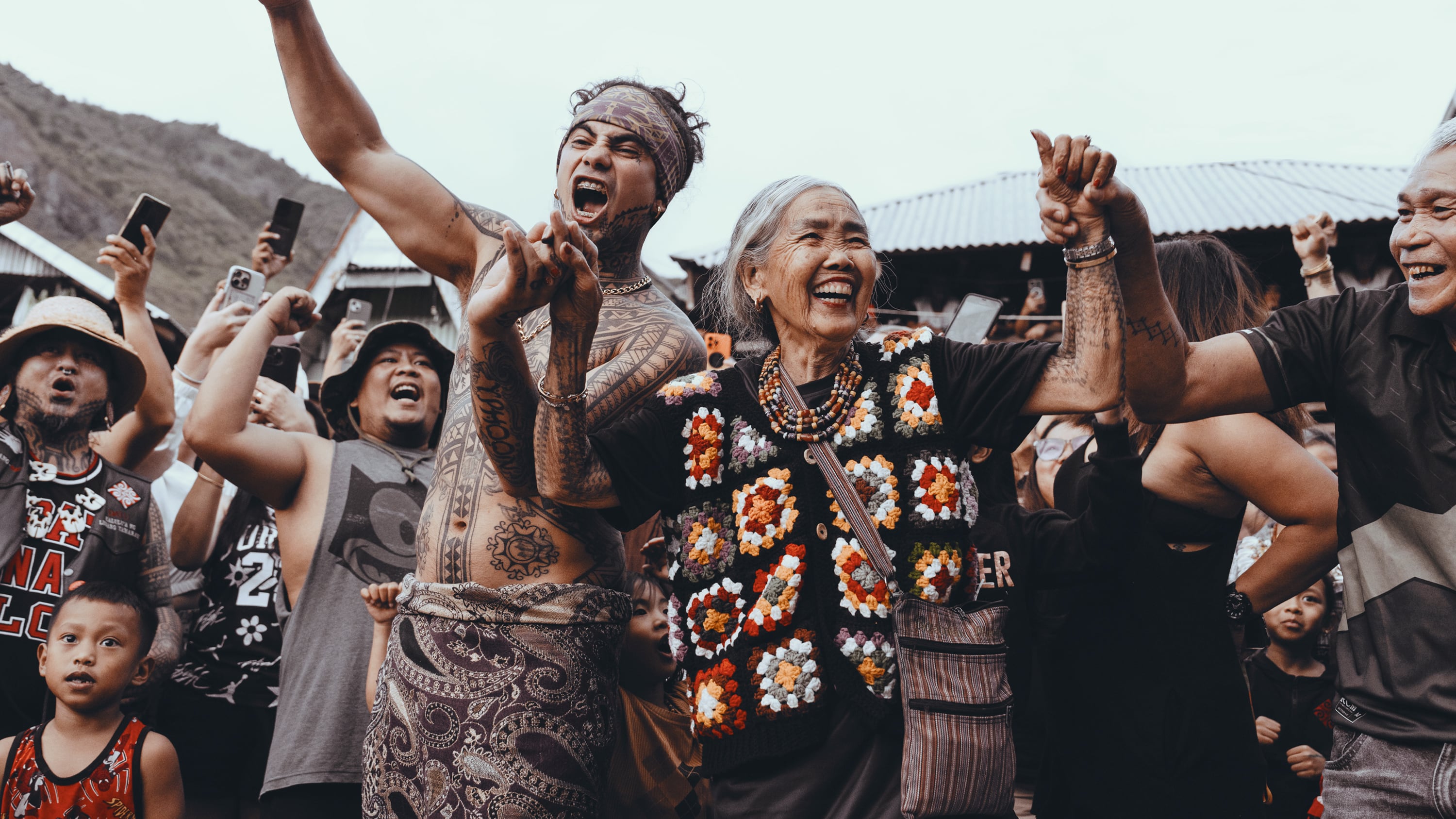Facebook might still be good for something after all.
Back in 2019, Portland rapper Talilo Marfil connected with traditional Filipino tattoo artist Apo Whang-od through Facebook. Marfil learned about Whang-od after seeing a documentary about the centenarian mambabatok, which literally translates as “person who hits or taps,” referring to Whang-od’s tattooing method. Whang-od made history last year as Vogue’s oldest cover model when she graced the Filipino edition at the age of 106. She turned 107 this past February.
Marfil found a guide to take him to Whang-od’s village, Buscalan, where he received tattoo work from her. The experience led Marfil to create his recently released single “Waves,” a song he wrote as a tribute to Whang-od and their people.
While in Buscalan, Marfil also filmed a music video for the song that premiered May 1. Whang-od appears alongside Marfil and her fellow villagers throughout the video, and even plays the flute to close out the track. Her voice is heard in the beginning, with English text translating her spoken Kalinga: “Because of being famous, I was able to get out of poverty. Unlike before, I don’t have to be a slave at work to survive.”
“These tattoos are specific to her tribe, and her decision to open it up to the public was an effort to keep the tradition going because it was dying out, because you couldn’t get those tattoos unless you killed someone,” Marfil says. “You couldn’t get those tattoos unless you accomplished something for the community, so there was a certain status that came with earning those tattoos.”
Whang-od tattoos in the traditional Kalinga style and belongs to the Butbut people, an Indigenous group who still practiced headhunting when she was a young girl.
“Typically, the Igorots and the headhunters were feared all across the Philippines,” Marfil says, using a term for Indigenous people from mountainous areas. “It was kind of taboo to go there because it was dangerous, but while all the rest of the Philippines was fearing them, they stopped doing that [headhunting] practice, and it took a while for people to get hip to that.”
Marfil is among a modern wave of artists and activists working to instill a new sense of pride in Filipino identity, rejecting Spanish and American colonialism in a return to Indigenous ways. He was born in the Philippines, to the coastal Visayan people. He immigrated to California as a child before making his way to Portland.
“Colonialism runs so deep, and I think, for a long time, Filipinos started taking pride in their identity, not knowing it was a colonial identity the whole time,” Marfil says. “Whang-od and her people are an example of an uncolonized people because the Spainards couldn’t colonize them because they were in the mountains, and when anyone tried to attack them, their martial arts and their resistance kept them uncolonized, so no wonder they have their tattoos.”
The “Waves” music video threads historic photos alongside modern footage of Buscalan and the Kalinga mountains. Marfil and villagers surround Whang-od, dancing and bouncing as she tattoos different people. Marfil wears traditionally patterned wraps around his legs, exposing a chest, neck and chin filled with intricate linework, while Whang-od wears ruby lipstick, a traditional beaded necklace and earrings, and a crocheted multicolored shirt, her silver hair slicked back into a ponytail.
“There’s more to life than this/There’s no point in clenching both your fists,” Marfil sings on “Waves” bridge. “From tribe to tribe and villages/there’s many pearls on my islands.”
During his stay in Buscalan, Whang-od tattooed Marfil, told him the Kalinga creation myth, and gave him a tribal name, Dung Dungan, the name of a warrior in one of the great Kalinga Epics.
Though it took Marfil four years to finish the “Waves” music video, which was released May 1, Whang-od still invited him back to Buscalan to celebrate him and the video on her birthday.
“I felt like the way that she treated me, she believed in me,” Marfil says. “She wanted a two pig sacrifice, but when I got up there, she sacrificed five pigs, celebrating the music video and believing it will have an impact in our community, specifically to our Filipino-American community.”
While in Buscalan, Marfil collected footage and is working to complete a documentary, and currently fundraising through GoFundMe.
Marfil often uses music to express his Filipino pride. In 2022, he went viral on Tiktok for his single “BIG Flip,” a slang term of unknown origin for Filipino Americans. “BIG Flip” featured support from rappers like Taryn, JayR Tha Barber, and Swiggle Mandela, WW’s recent best new band. Marfil is currently working on a collaboration with the rapper Tech N9ne, and dropping singles before he releases his debut album.
“The dope thing is this is creating a bridge between Filipinos in the Philippines and Filipino Americans, and that’s really big because there’s a huge disconnect there with our people, even to the point of hatred,” Marfil says of “Waves.”
“We’re trying to connect us, and I think this music video is a reminder that we come from these places, these Indigenous communities, and we need to return there.”

